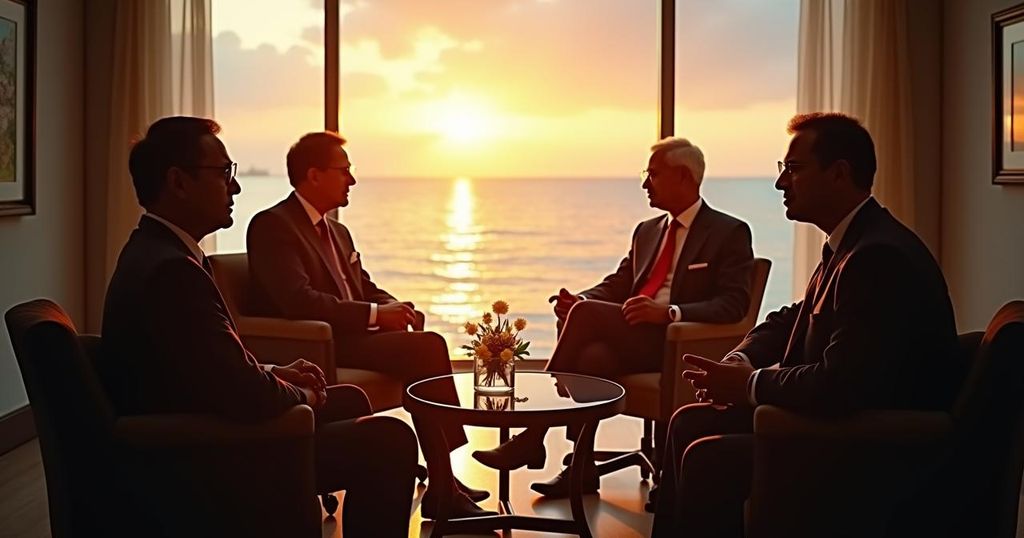President Mohamed Muizzu’s inaugural state visit to India aims to strengthen bilateral ties between the Maldives and India, which have deteriorated since his pro-China election victory. His discussions with Prime Minister Modi are focused on mutual interests amidst rising geopolitical competition in the region. The visit is critical to navigating shifting regional dynamics and confirming the historical ties between the two nations.
Maldives President Mohamed Muizzu has embarked on a significant five-day state visit to India, marking his first official trip since assuming office a year ago. The visit aims to renegotiate and strengthen the ties between the Maldives and India, which have become increasingly strained since President Muizzu, known for his pro-China stance, defeated the previous India-friendly administration of Ibrahim Mohamed Solih. Muizzu’s electoral promise included the withdrawal of Indian military personnel who were stationed in the Maldives for humanitarian assistance. During his visit, he is scheduled to engage with Indian Prime Minister Narendra Modi to discuss various mutual interests, including bilateral, regional, and international matters. The backdrop of escalating tensions is noteworthy; following Muizzu’s election victory, he undertook a trip to China prior to visiting India, which raised concerns in New Delhi. He publicly outlined intentions to lessen the Maldives’ reliance on Indian supplies and services, particularly in healthcare and essential imports. However, relations appear to have thawed somewhat since Muizzu attended Modi’s swearing-in ceremony for his third term in office, leading to an increase in official communications between the two countries. External Affairs Minister Subrahmanyam Jaishankar expressed optimistic expectations regarding the outcomes of Muizzu’s discussions with Modi, suggesting it may create a renewed impetus for friendly relations. India and China are actively competing for influence in the Maldives, strategically situated in the Indian Ocean. Historically, India has been a pivotal ally, contributing to various development initiatives across the nation. Conversely, the Maldives’ engagement with China’s Belt and Road Initiative further complicates this dynamic, as it seeks to enhance infrastructure while extending China’s political reach. Given the broader geopolitical challenges, including shifting politics in neighboring countries like Sri Lanka and Bangladesh, India’s engagement strategies are critically important. President Muizzu emphasized the necessity of maintaining a balanced approach, reassuring that he has no intention of replacing Indian forces with Chinese troops. He remarked on the historic nature of Maldives-India relations, describing it as intertwined “like the roots of a tree, built on centuries of exchanges and values shared.” This visit comes amid discussions on financial cooperation, reflecting a path forward aimed at addressing the Maldives’ significant foreign debt while managing its regional affiliations responsibly.
The Maldives has experienced complex political dynamics that influence its international relations, particularly with India and China. President Mohamed Muizzu’s rise to power marked a shift in Maldivian policy, emphasizing a move away from India and closer ties with China. This tension became prominent during the recent elections, where Muizzu’s promises to remove Indian military presence in the Maldives sparked concerns about the future of bilateral relations. The geopolitical landscape is compounded by both countries vying for influence in the region, particularly given the Maldives’ strategic location in the Indian Ocean. Understanding the historical context and the current political climate is essential for comprehending the significance of Muizzu’s state visit to India.
President Mohamed Muizzu’s visit to India signifies a potential turning point in Maldives-India relations, which have been under strain since his election. By engaging in high-level discussions with Prime Minister Modi, both leaders aim to explore new avenues for collaboration while navigating the competitive dynamics posed by China’s influence in the region. The visit reflects a broader necessity for regional stability and development, emphasizing the importance of preserving traditional ties amid emerging geopolitical challenges.
Original Source: www.livemint.com







